2019级专升本考研辅导讲座.ppt
- 格式:ppt
- 大小:2.10 MB
- 文档页数:18
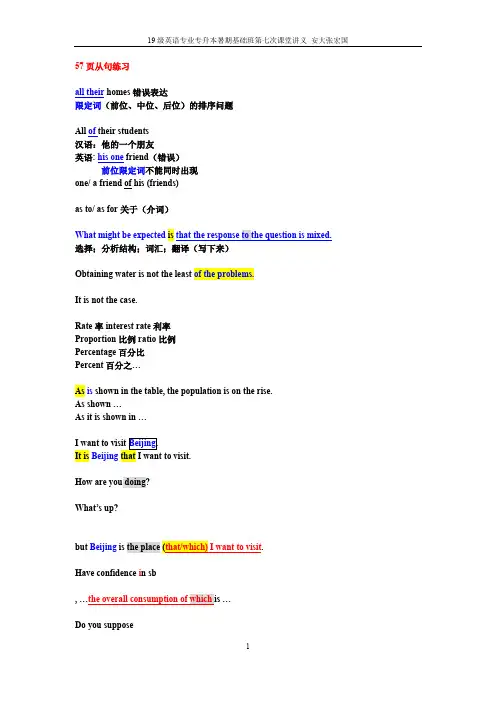
57页从句练习all their homes错误表达限定词(前位、中位、后位)的排序问题All of their students汉语:他的一个朋友英语: his one friend(错误)前位限定词不能同时出现one/ a friend of his (friends)as to/ as for关于(介词)What might be expected is that the response to the question is mixed.选择;分析结构;词汇;翻译(写下来)Obtaining water is not the least of the problems.It is not the case.Rate率interest rate利率Proportion比例ratio比例Percentage百分比Percent百分之…As is shown in the table, the population is on the rise.As shown …As it is shown in …It is BeijingHow are you doing?What’s up?but Beijing is the place (that/which) I want to visit.Have confidence i n sb, …Do you supposeYou suppose, I think, you knowDo sth with sth处理Deal with sth处理的提问whatDeal with的提问HowIt takes sb sth to do sth.It takes sth to do sth形式主语真正主语By sth, I mean…倒装句(一)全部倒装:谓语+主语(二)部分倒装—be动词/情态动词/助动词+主语+其他谓语部分(类似疑问语序)1.否定词提前seldom, never, little, hardly, not until…正常语序倒装语序.1)hardly/scarcely/barely…when…; no sooner …than…一…就…我一走进电影院,电影就开始了。
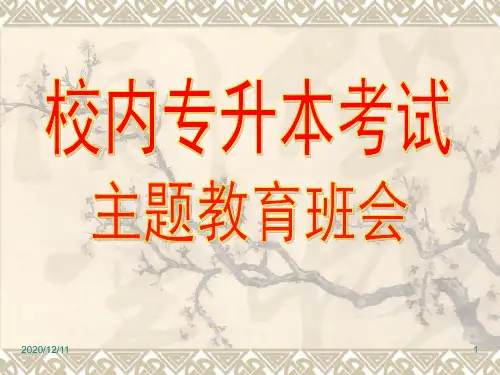
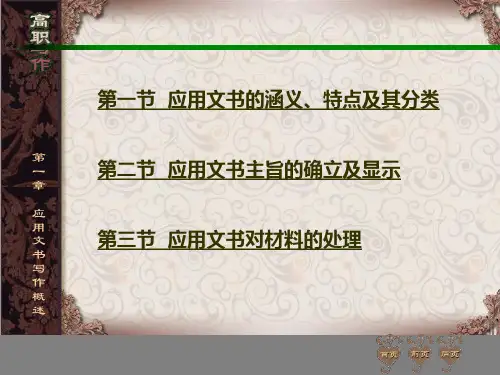


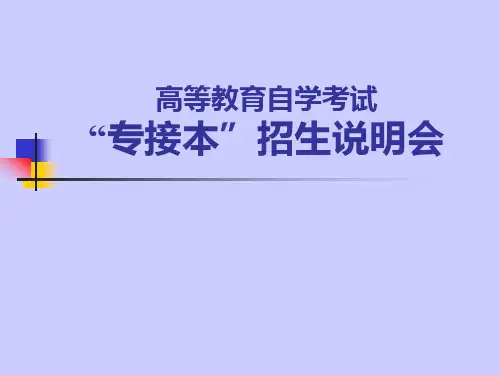
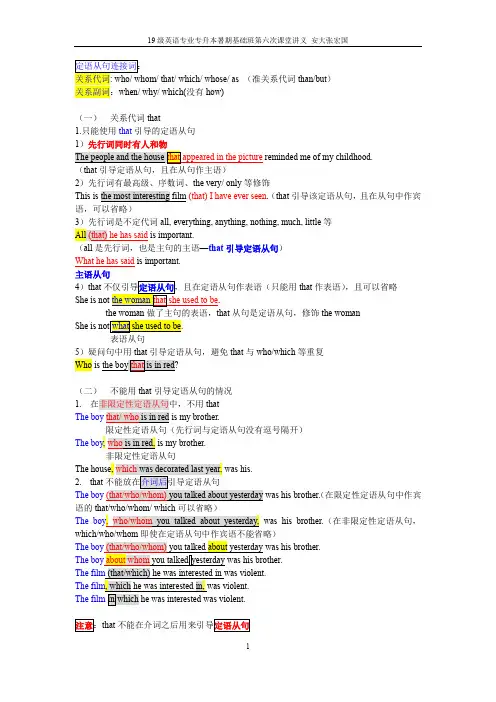
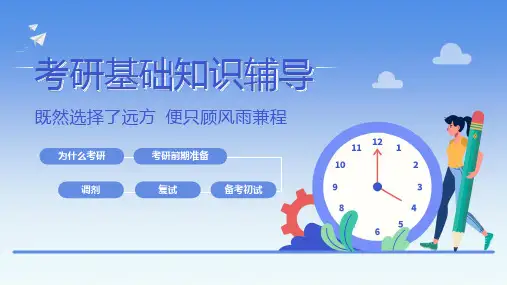
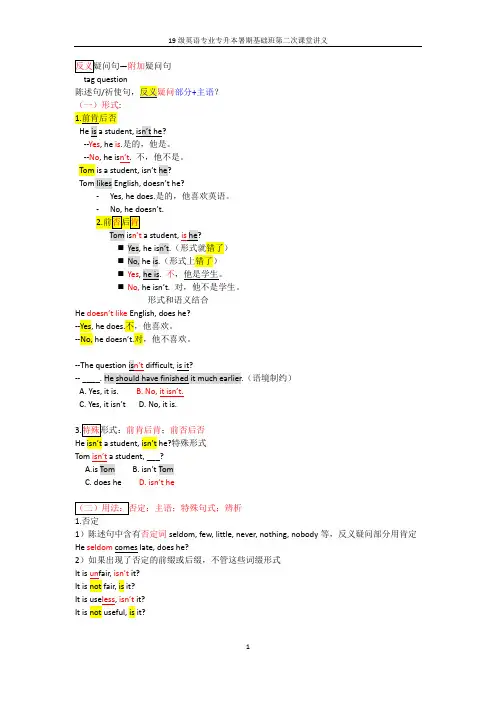
—附加疑问句tag question陈述句/部分+主语?(一)形式:--Yes, he is.是的,他是。
--No, he is n’t. 不,他不是。
Tom is a student, isn’t he?Tom likes English, doesn’t he?-Yes, he does.是的,他喜欢英语。
.Yes, he isn’t.No, he is.(形式上错了)⏹Yes, he is. 不,他是学生。
⏹No, he isn’t. 对,他不是学生。
形式和语义结合He doesn’t like English, does he?--Yes, he does.不,他喜欢。
--No, he doesn’t.对,他不喜欢。
(语境制约)A. Yes, it is.B. No, it isn’t.C. Yes, it isn’tD. No, it is.前肯后肯;前否后否t a student, isn’t he?特殊形式Tom isn’t a student, ___?A.i s TomB. isn’t TomC. does heD. isn’t he1.否定1)陈述句中含有否定词seldom, few, little, never, nothing, nobody等,反义疑问部分用肯定He seldom comes late, does he?2)如果出现了否定的前缀或后缀,不管这些词缀形式isn’t it?It is not fair, is it?isn’t it?It is not useful, is it?1)不定代词something, everything, nothing, anything,反义疑问部分主语用代词it代替Everything goes well, doesn’t it?is correct, is it?2)不定代词everybody, nobody, somebody, anybodyEverybody is here, isn’t he?(传统语法)Everybody is here, aren’t they?Nobody is here, are they/ is he?3)主语是II am a student, aren’t I?I wish to go there, may I?3.特殊句式you,被省略,表达命令(不能用don’t you)Don’t close the door, will you?Let’s go there, shall we?’t there? (不能用isn’t it)There will be a tree in front of the room, won’t there?Here is a piece of advice for you, isn’t here?3. 并列句—反义疑问句取决于后面的句子—就近原则He is absent, isn’t he?简单句His mother is ill, isn’t she?简单句isn’t she?并列连词“因为”—并列句isn’t she?并列句his mother is ill, isn’t he?引导从句—主从句,动词是think/ suppose等主观性动词,后面接宾语从句时,反义疑问句取决于宾语从句I think that he is right, isn’t he?I do n’t think that he is right, is he?think that she is right, does he? (不能取决于从句,而是取决于主句,因为主语不1wouldn’t he?hadn’t he?wouldn’t he?hadn’t he?2)区分have是实义动词动词还是助动词He has(hasHe has a wonderful time in Hefei, doesn’t he?(has是实义动词)He has lunch at 12:00, doesn’t he?He has finished his lunch, hasn’t he?(has是助动词,构成完成时)3)区分need/dare是实义动词还是情态动词Need /dare to do sth实义动词Need/dare do sth情态动词He needs 100 yuan, doesn’t he?实义动词He need pay 100 yuan, needn’t he?情态动词Must do/ must be doing 对现在的猜测Look! The light is on. Tom must be studying in the classroom now, isn’t he?Look. Tom is studying in the classroom now, isn’t he?didn’t it?对应的事实是:He must have been to Japan,(对应的事实是:He has been to Japan, hasn’t he?)couldn’t /cannot have donehave rained last night, did it? (对应的事实:it didn’t rain last night, did it?)祈使句—表达命令What+名词(核心词)How+形容词/副词/句子(一)what+名词(核心词)what+形容词+名词(如果形容词和名词之间没有其他词,用what;如果形容词和名词之间有其他词the/an/a/ his…则用How)(it is)!(it is)!—单数名词How hot (it is)!What diligent you are!are!What hot weather it is!不可数名词How slowly he runs!(how+副词)How time flies!How +句子What fun!很有趣!(fun是不可数名词)How funny!很滑稽!(funny是形容词)What a mess!1989Face eye nose earX2 smaller than X功能分类1.简单句(一个主谓结构)2.并列句—并列连词3.主从句—从属连词4.并列复合句(一)简单句语言是思维的外在形式—言由心生—思维反映物质世界的—运动是绝对的“运动”在语言中是动词,作谓语;“运动的主体(发出者)”在语言中是主语;“运动的承受者”是语言中的宾语但是不是所有的动作都有承受者;有些动作没有承受者,这些动词就是不及物动词(没有对象)我游泳。


专升本大学课堂PPTcontents •专升本概述•专升本考试内容与难度•专升本备考策略与方法•专升本大学生活与学习体验•专升本就业前景与优势•专升本大学课堂互动环节目录01专升本概述专升本的定义与意义定义专升本是指专科层次学生进入本科层次阶段学习的选拔考试,是中国大陆教育体制大专层次学生升入本科院校的考试制度。
意义专升本对于专科生来说是一次提升学历和拓宽职业发展道路的重要机会。
通过专升本考试,学生可以获得本科学历,进一步提升自己的知识水平和综合素质,增强就业竞争力。
专升本的学历层次与学制学历层次专升本学生毕业后获得本科学历,与普通本科生具有同等学历地位。
学制专升本学制一般为2年,部分专业可能为3年,具体以各省份招生政策为准。
专升本的历史与发展历史专升本考试制度在中国教育史上具有重要地位,自1977年恢复高考以来,专升本考试一直作为选拔优秀专科生升入本科的重要途径。
发展随着社会经济的发展和人才需求的变化,专升本考试制度也在不断改革和完善。
近年来,各省份纷纷出台相关政策,扩大专升本招生规模,提高选拔标准和质量,为更多专科生提供了升学机会。
02专升本考试内容与难度考试科目与题型考试科目专升本考试通常包括公共课和专业课两大类。
公共课主要考察学生的基本素质和综合能力,如语文、数学、英语等;专业课则根据学生所报考的专业进行设置,考察学生对专业基础知识的掌握程度。
题型分布专升本考试题型多样,包括选择题、填空题、简答题、论述题等。
不同科目和题型的分值和难度也有所不同,需要学生有针对性地进行备考。
考试难度与通过率考试难度专升本考试难度适中,既考察学生的基础知识掌握情况,又要求学生具备一定的分析问题和解决问题的能力。
考试内容通常涵盖专科阶段的核心知识点,并要求学生能够灵活运用所学知识。
通过率专升本考试的通过率因地区、学校和专业而异。
一般来说,通过率较高,但学生仍需认真备考,掌握考试技巧和方法,以提高自己的通过率。